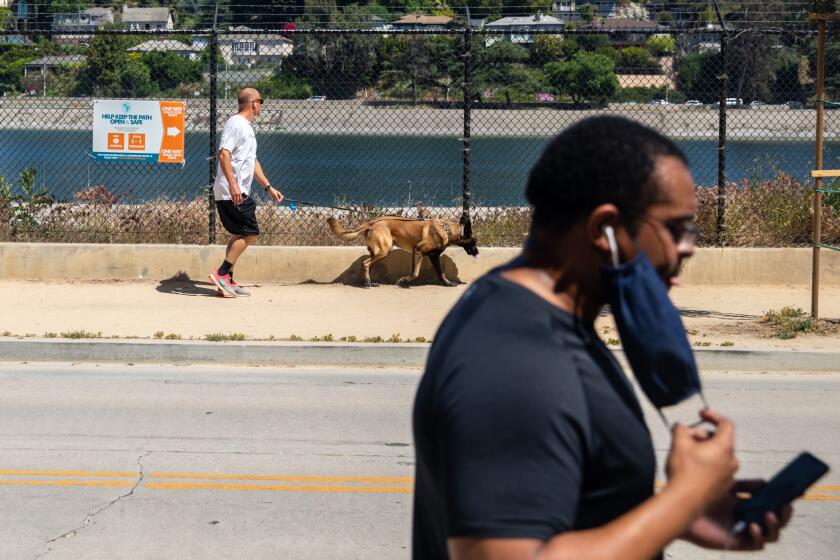Facing schedule delays, L.A. Metro seeks $120 million more for Crenshaw Line
- Share via
Following a series of delays and construction problems, Los Angeles County transportation officials are seeking $120 million more for a light-rail line from Mid-City to the South Bay.
The cost overruns on the $2.06-billion Crenshaw Line come as crews work to repair flaws in the project, delaying its opening to mid-2021.
If the Metropolitan Transportation Authority’s directors approve two budget requests at their Thursday meeting, the cost of the Crenshaw Line will rise by $90 million, or 4%. The increase would be the first since 2013.
Directors also have been asked to approve a $30-million budget for close-out work after the line opens.
Most of the $90-million budget increase would be used to pay Metro employees and consultants through the end of the year, costs that were not previously accounted for because work was slated to be finished already, officials said.
Metro would also add $14.2 million to the project’s rainy day fund, and spend $4 million to hire a “claims support consultant” to prepare documentation for claims filed by the contractor, a joint venture of Walsh Construction and J.F. Shea Construction.
The orders by L.A. city and county have joggers, runners and others seeking exercise trying to figure out how to incorporate masks into their workouts.
Metro officials have cautioned that the new estimated opening date is not a sure thing. The contractor is working through some of the trickiest tasks on the project, including connecting the communications lines and power systems inside the subway tunnels that will control the rail line.
“We hire the contractor to actually get this work completed,” said Rick Clarke, Metro’s head of construction, during a meeting last month. “They have to commit the resources and the expertise to get it done and get it done right. There is some risk of them not doing that.”
Chief Executive Phil Washington told Metro’s directors that he didn’t want to “go on record saying what day and month” the project would open.
Not revealing a more detailed opening date is “trying to hide the ball a little bit,” Metro director and Los Angeles County Supervisor Janice Hahn responded.
“I know you’re hesitant to do that because it’s painful if you have to keep pushing it,” Hahn said. “But for us, the directors and the public, we need to know.”
The Crenshaw Line broke ground in January 2014 and was originally supposed to open in 2019. The 8.5-mile route will run through Inglewood and the Los Angeles neighborhoods of Baldwin Hills, Hyde Park, Leimert Park and Westchester.
After Walsh/Shea encountered problems during early construction, Metro paid the contractor $55.5 million in September 2017 to avoid later litigation. The settlement included an agreed-upon opening date of October 2019.
“They didn’t meet their milestones to make that date,” Clarke said. “They did not deliver.”
So as crews wrestled with problems with electrical substations, sidewalks and gas lines in 2018, Metro and Walsh/Shea reached another settlement that bumped the project’s opening date to mid-2020.
Last month, officials acknowledged that the project had fallen behind schedule again and delayed its opening by another year.
The Crenshaw Line is now 95% complete, but construction crews are working to fix a problem with the concrete slabs used to stabilize and anchor the train tracks on bridges and in tunnels.
The slabs, called plinths, are supposed to be tightly secured with steel reinforcements to a platform beneath the tracks. In several hundred locations, the reinforcements — called rebar — were installed incorrectly, officials said.
The contractor is also working to repair ground settlement in walls that support a rail bridge over La Brea Avenue near downtown Inglewood.
The proposed budget increase would be funded through federal air quality grants and revenue earmarked for local government groups in Measure M, the sales tax increase that voters approved in 2016.
The South Bay Cities Council of Governments agreed to cover up to 37% of the cost overrun, or up to $33.3 million, because that’s the share of the project that is in the South Bay, said executive director Jacki Bacharach. The rest of the money will have to come from the Westside and central Los Angeles, she said.
“There could be more overruns down the line,” Bacharach said, “but this is it from us — this is all we’re paying.”
The Crenshaw Line is partially funded through Measure R, the half-cent sales tax increase that voters approved in 2008. The project also received a $545.9-million federal loan and about $130 million in other federal transportation funds.
More to Read
Sign up for Essential California
The most important California stories and recommendations in your inbox every morning.
You may occasionally receive promotional content from the Los Angeles Times.















